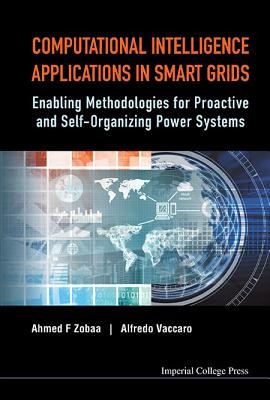
- We will send in 10–14 business days.
- Publisher: Imperial College Press
- Year: 2014
- ISBN-10: 1783265876
- ISBN-13: 9781783265879
- Format: 17.1 x 23.2 x 1.5 cm, kieti viršeliai
- Language: English
- SAVE -10% with code: EXTRA
Computational Intelligence Applications in Smart Grids: Enabling Methodologies for Proactive and Self-Organizing Power Systems (e-book) (used book) | bookbook.eu
Reviews
Description
This book considers the emerging technologies and methodologies of the application of computational intelligence to smart grids.From a conceptual point of view, the smart grid is the convergence of information and operational technologies applied to the electric grid, allowing sustainable options to customers and improved levels of security. Smart grid technologies include advanced sensing systems, two-way high-speed communications, monitoring and enterprise analysis software, and related services used to obtain location-specific and real-time actionable data for the provision of enhanced services for both system operators (i.e. distribution automation, asset management, advanced metering infrastructure) and end-users (i.e. demand side management, demand response).In this context, a crucial issue is how to support the evolution of existing electrical grids from static hierarchal systems to self-organizing, highly scalable and pervasive networks. Modern trends are oriented toward the employment of computational intelligence techniques for deploying advanced control, protection and monitoring architectures that move away from the older centralized paradigm to systems distributed across the field with an increasing pervasion of intelligence devices. The large-scale deployment of computational intelligence technologies in smart grids could lead to a more efficient tasks distribution amongst energy resources and, consequently, to a sensible improvement of the electrical grid flexibility.
EXTRA 10 % discount with code: EXTRA
The promotion ends in 21d.15:01:19
The discount code is valid when purchasing from 10 €. Discounts do not stack.
- Publisher: Imperial College Press
- Year: 2014
- ISBN-10: 1783265876
- ISBN-13: 9781783265879
- Format: 17.1 x 23.2 x 1.5 cm, kieti viršeliai
- Language: English English
This book considers the emerging technologies and methodologies of the application of computational intelligence to smart grids.From a conceptual point of view, the smart grid is the convergence of information and operational technologies applied to the electric grid, allowing sustainable options to customers and improved levels of security. Smart grid technologies include advanced sensing systems, two-way high-speed communications, monitoring and enterprise analysis software, and related services used to obtain location-specific and real-time actionable data for the provision of enhanced services for both system operators (i.e. distribution automation, asset management, advanced metering infrastructure) and end-users (i.e. demand side management, demand response).In this context, a crucial issue is how to support the evolution of existing electrical grids from static hierarchal systems to self-organizing, highly scalable and pervasive networks. Modern trends are oriented toward the employment of computational intelligence techniques for deploying advanced control, protection and monitoring architectures that move away from the older centralized paradigm to systems distributed across the field with an increasing pervasion of intelligence devices. The large-scale deployment of computational intelligence technologies in smart grids could lead to a more efficient tasks distribution amongst energy resources and, consequently, to a sensible improvement of the electrical grid flexibility.


Reviews